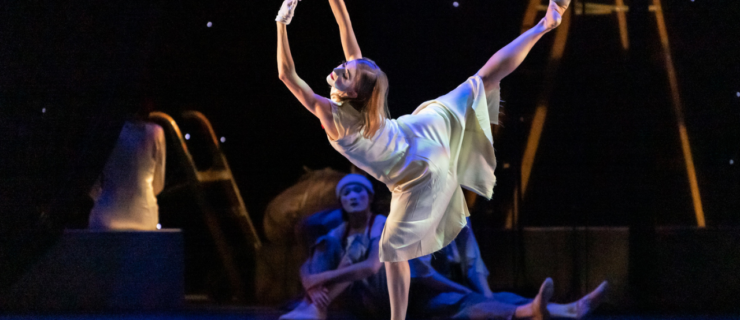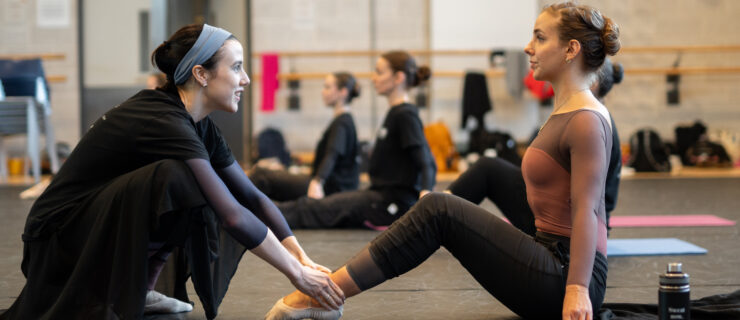On My Own: Building a Freelance Career Can Offer Opportunities for Growth
One of my first jobs as a freelance dancer was performing at a gallery opening for the artist Alex Prager in September 2016. The audience was feet away—one miscalculated battement could land squarely in someone’s face. Normally, this situation would have jarred me. Earlier in my career as a soloist with Pennsylvania Ballet, I struggled with varying degrees of stage fright, ranging from preshow jitters to fairly debilitating panic. Yet now at the gallery, I was surprised to find how little the audience’s closeness unnerved me. Being face-to-face with performance-goers enabled me to confront my fear in a very literal way. The experience awakened me, showing me that freelancing could offer opportunities for growth I hadn’t found in company life.
Transitioning from a professional company to freelance dancing can be daunting. Holding yourself accountable for taking class and securing your own performance opportunities is a dramatic shift when you’re used to having those things provided for you. Yet freelancing often enables dancers to shape careers that are fulfilling in uniquely personal ways. As the coronavirus continues to alter the company experience, building a freelance career can offer meaning and possibility for dancers as they adapt to shifting circumstances.

Courtesy Evelyn Kocak
Accepting the Unexpected
A freelance dance career often evolves out of circumstantial necessity. Argentinian-born dancer Jonatan Lujan left the Slovak National Theatre to be together with his wife, American Ballet Theatre soloist Luciana Paris, and their young son in New York City. The variety of projects and flexibility of New York’s freelance scene offered him the best opportunity for balancing work and family life. “There are a lot of things I can do here,” says Lujan. “I decided I will definitely change my life and I will go there and try.”
Freelancing can be a difficult adjustment when it doesn’t feel like a choice, especially if due to job loss. When a massive layoff by a newly appointed director precipitated my own departure from Pennsylvania Ballet in 2016, I found it challenging to simultaneously process the trauma, adapt to my new scenario and initially pursue freelancing with confidence. With the coronavirus pandemic threatening the future of ballet companies more broadly, many may face similar challenges of adjusting to suddenly unfamiliar professional terrain.
In addition to securing gigs, juggling an inconsistent schedule and staying in shape, freelancers often take on additional part-time work to make ends meet. Since moving to New York, I’ve held jobs in the retail, fitness and service industries to support my dance aspirations while attending school full-time at Hunter College. While it’s not easy, these circumstances have reaffirmed my love of the art form, encouraging me to discover the creative potential of my dance career.

James Jin, Courtesy Jonatan Lujan
The Power of Choice
As COVID-19 has asked us to reimagine what the future in dance might look like, freelancing provides a way to expand our participation in this vision. For one thing, it enables dancers to choose projects and collaborators that align more closely with their artistic ideals. For former Joffrey Ballet dancer Abigail Simon, an early freelancing experience working with Tony Award–winning director and choreographer Rob Ashford on the musical Carousel revealed acting talents she had once been told she didn’t possess. The process helped her to understand the restrictions of company life. “I want to work with people that want me, in an environment where we’re all creative and supporting each other,” she says. Afterwards Simon freelanced as a principal guest artist before joining the international tour of An American in Paris.
Lujan has been fortunate to find consistent work, collaborating with the likes of MorDance, Tom Gold Dance and Diana Vishneva, on her Sleeping Beauty Dreams project. (He admits that the demand for male partners has helped provide many projects.) A particular highlight for Lujan has been working with Felipe Escalante and his company Tabula Rasa Dance Theater. The experience, he says, “was really special, because the choreographer is so focused on working with the dancer, and the work offers another kind of mentality about movement.”

Ricky Wang, Courtesy Abigail Simon
Building Your Career
Losing the stability that a company provides takes getting used to. Simon notes she misses “a consistent paycheck and health insurance.” Lujan says the lack of a routine can leave him feeling unmotivated at times.
Still, the potential for taking the reins of one’s own career is undeniably appealing. In addition to dancing, Simon has started her own representation and master-class-teaching company, Simon and Thompson Entertainment. For Lujan, the coronavirus pandemic has necessitated the use of digital platforms for performing and teaching—a creative solution he was fully prepared to embrace given freelancing’s flexibility.
When I left Pennsylvania Ballet, I knew only that I wanted to end up in New York City. Four years later, my freelance career has given me the opportunity to dance in Europe, to collaborate with artists of different mediums, and to perform the Nutcracker pas de deux with two of my best friends (former Miami City Ballet dancer Michael Sean Breeden and New York City Ballet soloist Daniel Applebaum). Dancing as an independent artist has freed me from the fear I once felt onstage, giving me ownership over my dancing in a way companies could not provide and helping me to connect with the audience. Simon urges that nothing in a dancer’s career is a waste, noting that her experiences in companies led her to where she is today: “Once you figure out a way to utilize everything that you do, you’ll be successful.”
5 Tips for Dancers New to Freelancing
As the coronavirus changes the landscape of the ballet world, many dancers will likely embrace unexpected freelance opportunities. Here are five tips for dancers new to navigating them.
- Stay open to possibilities.
Even if the project seems out of your comfort zone, welcome the chance to learn a new style or way of working. - Discuss payment early
. It can be an awkward conversation, but negotiating pay before agreeing to the terms of the engagement is critical for avoiding larger misunderstandings down the line. Ask how often you will receive a check (weekly, every two weeks, a one-time fee?) and whether taxes will be taken out. - Agree on a rehearsal schedule.
Laying out expectations for how often and when you will rehearse is important for avoiding conflict and injury. - Discuss shoe and costume requirements.
Understanding what supplies will be provided or required of you early on can help you budget and negotiate for assistance with covering expenses. - Create a routine for yourself.
Even if it differs from the daily class schedule of a ballet company, make sure you have a wellness routine in place to take care of your physical and mental health.





